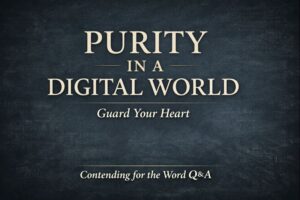⏱️ Estimated Reading Time: 6 min read
[et_pb_section bb_built=”1″ admin_label=”section”][et_pb_row admin_label=”row”][et_pb_column type=”4_4″][et_pb_button admin_label=”Button” url_new_window=”on” button_alignment=”left” background_layout=”light” custom_button=”off” button_letter_spacing=”0″ button_use_icon=”default” button_icon_placement=”right” button_on_hover=”on” button_letter_spacing_hover=”0″ button_url=”https://servantsofgrace.org/wp-content/uploads/2017/05/HermeneuticsTheArtandScienceofBiblicalInterpretation.pdf” button_text=”Hermeneutics: The Art and Science of Biblical Interpretation” /][et_pb_text admin_label=”Text”]
A result of the trend towards biblical illiteracy and sound-bite approaches to theology is that of the difficulty many have with proper interaction with the biblical text. The big nerdy term for how to interpret Scripture is called hermeneutics. Subsumed within the “big idea” if you will of the discipline of hermeneutics are a number of methodologies for doing sound biblical exegesis. One important method is something I like to call investigative theology—asking the correct questions of the biblical text.
In journalism school, future news reporters are taught the basics of asking the big five questions: who, what, when, where, and why. These questions are intended to ensure all the facts are gathered and reviewed, the important players identified, background information understood, and the reason for what is being reported upon fully grasped. Once all those questions have been asked and the information resulting from asking those questions collated, a news story takes shape and can then be shared.
We can utilize this same approach to investigative journalism to our study of Scripture. Asking the correct questions will help lead us to a proper understanding of what God is telling us in His Word. Now mind you simply asking questions and hoping the answer will magically jump off the pages of your Bible without putting in any level of effort is likely not going to happen. Doing good Bible study takes time and effort and avoiding sound-bite theology is essential. After asking each question, one may find themselves asking additional questions that will lead to related texts that provide another piece to the overall biblical mosaic.
Let’s use the shortest verse in Scripture as a test case for what investigative theology looks like in practice.
John 11:35 – “Jesus wept.”
Who – The first inclination is to respond with the “who” being Jesus. After all, it is Jesus who is weeping. Part of asking “who” involves noting everyone involved or being impacted by the text. In the case of this passage, Jesus is weeping for a reason. Sometimes establishing the rest of the “who” will reveal itself over the course of asking the remainder of the series of questions. This verse is an example of such an instance.
What – The response to this question identifies the action taking place. What do we find Jesus doing in this verse? He is weeping. At this stage, the reason for his tears are not known; however, continuing with the rest of the questions will soon reveal the reason for Jesus’ tears. At this point, we merely identify the action taking place. In this case, as we have noted, Jesus is weeping.
When – This question explores the timing of the event. In the case of John 11:35, at what point in the ministry of Jesus did this even take place? Even matters such as the time of day, time of year, or any other timing markers that may be provided in the text should be identified. In our test text, there are no indications of when. This will require us then to look at the surrounding context for an answer. Jesus wept after he saw the dead body of his friend Lazarus.
Where – When asking where, the need is to identify the location of the event. Our text does not provide a location, so, once again, we have to look at the surrounding context. If you scan up to John 11:18, it is clear that Lazarus lived in Bethany. Jesus journeyed from Jerusalem to Bethany.
Why – This particular question involves digging into the immediate and surrounding context in order to explore the reason Jesus wept. We have a limited understanding based on the previous questions, most notably that Lazarus had died and when Jesus saw the dead body of his friend, he then wept. If we simply stop there without asking any additional questions, we will miss some important matters found in the overall context. When asking why, there is the inherent need to first engage the immediate verse and after looking at all the facets of what that verse provides; to then step back to the surrounding verses for information and then to even step back to the overall chapter, book, location in the overall biblical text; and even as far back as how this verse fits into the overall flow of Scripture.
In fact, asking why is arguably one of the most important questions one can ask of the text. A warning though: asking why involves staying rooted in the information provided in the verse, context, chapter, book, and Scripture. Why can sometimes lead people down rabbit trails. At times, those rabbit-trail journeys are worthwhile, provided it properly informs the understanding of the text. For instance, there is much to be gleaned from even a two word verse such as John 11:35. It is a power packed passage that speaks to the humanity and divinity of Jesus. He identified with our sadness by weeping over the death of his friend, while at the same time revealing his power of death by raising Lazarus from the grave. Asking why leads to the identification of those two important truths. Asking why helps us understand the reason Jesus delayed in coming to Bethany. Those are rabbit trails that are of value. On the other hand, if you ask the question of why and it leads you in this case to a study of the social structure of ancient Bethany, then perhaps you have gone done a rabbit trail that does not provide information germane to the immediate text you are engaging.
Doing investigate theology is not the end all of sound Bible study and exegesis. It will, however, enable you to identify key information about the text. That information can then serve as a solid foundation for further in-depth study. I encourage you to practice doing investigative theology with smaller passages such as John 11:35, and then move on to more complicated texts once you have the hang of working through these questions. Keep track of what you discover as many times what you discover in one text will inform and grow your understanding of other related texts. So, get out there and investigate God’s Word! It is well worth the time and effort.
[/et_pb_text][/et_pb_column][/et_pb_row][/et_pb_section]




